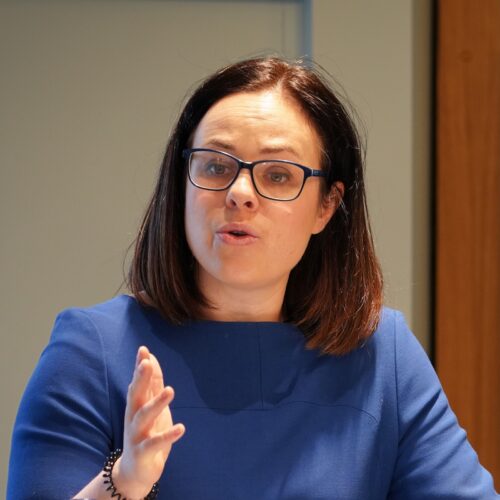AUGUST, Edinburgh. Deputy First Minister Kate Forbes MSP arrives for a live interview; staff ask for a panic room, as widely reported at the time. The venue later apologises for hosting her at all.
You can feel it in every room: the walls are closing in – not as a slogan, but as a fact of public life. What used to be normal disagreement is now treated as a risk to be managed. That isn’t just censorship; it’s self-censorship – and the squeeze is falling hardest on women.
No formal ban was issued in Edinburgh. The walls were simply moved inward until the event carried a health warning. That’s how a public square narrows in practice.
Roll back two summers. Joanna Cherry MP is booked for a Fringe event. Staff refuse to work it, the show is pulled, lawyers get involved, the booking is reinstated, and the institution apologises. Not a statute silencing a politician – just a gatekeeping culture trying to take the stage from a woman who won’t parrot the line on sex-based rights.
Head south and the pattern holds. Rosie Duffield MP has skipped local hustings because the hostility and threats are relentless. An MP avoiding a basic voter forum isn’t a diary quirk; it’s a sign the civic room has narrowed until a woman thinks twice about standing in it.
None of this needs a censor’s red pen. It takes venue policies, “values” statements and security theatre – and a legal climate ambiguous enough to chill – to make people police themselves. That’s how self-censorship becomes the house style.
The architecture of silence
You don’t need prohibitions when you have process. Venue terms. HR protocols. “Dignity at work” rules stretched past their purpose. Security assessments that become vetoes in all but name.
Layer in legal fog – see the Hate Crime and Public Order (Scotland) Act, with its elastic definitions of “abusive” speech – and the effect is predictable: people trim sentences, swerve topics, decline invitations, and ladle on caveats until the point collapses.
Result: careful words, careful silences, careful disengagement. The oxygen leaks out of debate and everyone learns to breathe shallowly.
I took a speaking slot at FiLiA ’23. I’d seen the backlash online that other announced speakers got, and I felt it. Outside, protesters hurled abuse; security was heavy – unsettling, yet needed. In a session with Johann Lamont and Joanna Cherry, I spoke from the floor to thank them. Their example makes it easier for newer politicians like me to speak frankly about women’s rights, even when the climate says keep quiet.
Why women feel the squeeze first
Men get pile-ons too. But watch where the stage literally disappears – where apologies are issued for a guest’s presence, and “security” is the pretext for cancellation. It clusters around women who speak plainly on sex and gender, or whose faith informs their politics.
For years they were told to take up space. Now the instruction is different: mind your tone, moderate your beliefs, make yourself smaller. That’s not equality; it’s an equal-opportunities gag.
Hard censorship is obvious: a cancelled event, a withdrawn platform, a disciplinary.
Soft censorship is subtler and more corrosive: “we can’t support the impact of hosting you”; “let’s not distract from priorities”; “for unity, could you not raise this now?” None of those measures bans content. All shrink the space where women can contribute.
A few high-profile cases are enough. Forbes with panic-room theatre. Cherry with a pulled booking. Duffield with no-show hustings. Others get the hint. No one needs to order silence when the consequences are on display.
When women pre-shrink their speech, voters lose. Scrutiny turns tepid. Interviews become risk-managed PR. Hustings are sanitised or abandoned. Policies pass with fewer stress-tests. Consensus looks broad only because dissenters were pushed to the edges.
It also tells a bleak story to younger women: politics is open, but the small print says avoid certain subjects, apologise for convictions, and carry the reputational cost if you don’t. That isn’t progress. It’s polite control.
Re-opening the room
We don’t need new rights; we need to use the ones we have.
1. Venue neutrality for lawful debate. Especially where public money is involved, events should be policed to proceed, not pre-emptively apologised for.
2. Clear guiderails. Ministers should state, in black and white, how the hate-crime regime interacts with political speech and how frivolous complaints will be handled. Ambiguity fuels self-censorship; clarity widens the room.
3. Party tolerance for conscience. Representation isn’t chorus work. If a member argues – in good faith – on sex, gender or belief, treat it as debate, not contamination.
4. A civic norm: argue, don’t ostracise. Media bookers, arts bodies, universities and councils should recommit to hosting disagreement. Inclusion should mean more speech, not fewer voices.
Call things by their name
Let’s stop pretending this is about “safety” or “kindness.” When a woman is told she can’t speak on a stage her constituents paid for, that’s censorship. When she stays away because the cost is too high, that’s self-censorship – engineered by a system that makes ordinary political speech feel dangerous.
Kate Forbes shouldn’t walk into a panic room. Joanna Cherry shouldn’t have to resort to legal wrangling to keep a booking. Rosie Duffield shouldn’t have to choose between her views and her safety at a village hall. These aren’t special pleas; they’re minimum standards for a mature democracy.
A confident country doesn’t curate its women’s voices; it welcomes them and engages on the merits. It doesn’t treat dissent as a biohazard; it treats it as due process. If equality is to mean anything, it must include the freedom to express unpopular views without being boxed in by bureaucratic theatre or cultural gatekeeping.
Our choice is simple: accept a shrinking space for speech, or widen the doorway and bring the arguments back into daylight. A confident country will know strong women, be them, and raise them. After all, well-behaved women rarely make history.
Established in 2006, ThinkScotland is not for profit (it makes a loss) and relies on donations to continue publishing our wide range of opinions – you can follow us on X here – like and comment on facebook here and support ThinkScotland by making a donation here.
Photo courtesy of Scottish Government – Deputy First Minister Kate Forbes, CC BY 2.0, https://commons.wikimedia.org/w/index.php?curid=167513073











